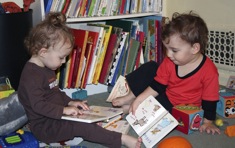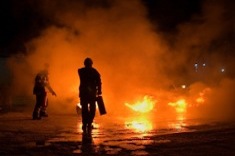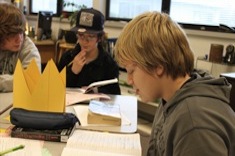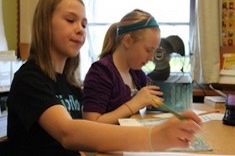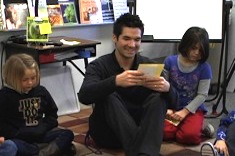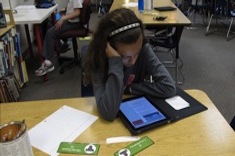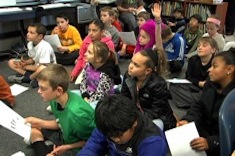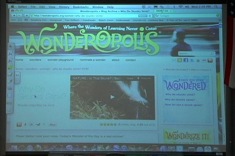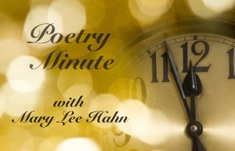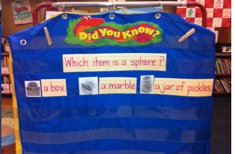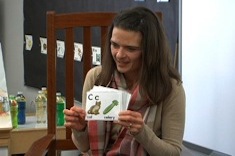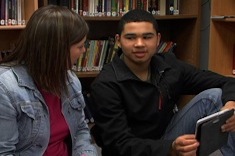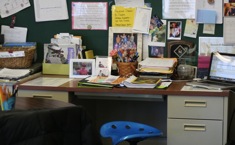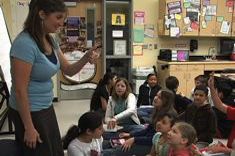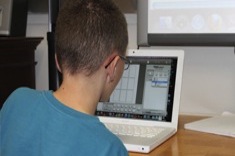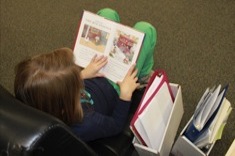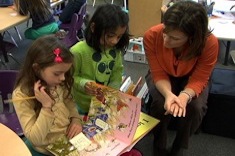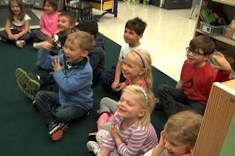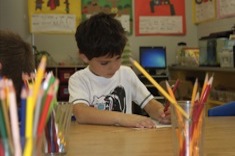Library
Choice Literacy Articles & Videos
The Choice Literacy library contains over 3,000 articles and 900 videos from 150+ contributors. Classic Classroom and Literacy Leadership subscribers have access to the entire library. Content is updated continuously, with five to six new features published each week.
Latest Content
Family Literacy Night
Family Literacy Nights have become popular in many schools. Principal Jennifer Schwanke describes the format for a successful event, including a sample program and tips.
A Literary Taste of Home (Home is Where the Books Are Series)
Meghan Rose may live in Los Angeles, but the home of her heart will always be New England. In this booklist, she shares her favorite picture books about everything from the Red Sox to Maine blueberries to give her children a sense of where she grew up.
Hindsight: What I Wish I’d Known Before My School Burned Down
Melanie Quinn shares lessons from the fire that burned down her school.
The Big Fresh March 30, 2013 Appreciation
This week’s Big Fresh features resources for the start of National Poetry Month.
Just-Right Poetry and Individualizing Instruction
Shari Frost describes how a sixth-grade teacher provides a range of poetry options to meet the needs of all students.
The “Tys” of Student Research: Safety and Credibility (Primary Research Series Part 2)
Heather Rader shares the second installment in our primary research series.
March Book Madness
Basketball’s March Madness has many possibilities in schools. Tony Keefer tries a similar format with brackets and voting for March Book Madness.
Poetry and Fluency Minilesson in Second Grade
Sean Moore uses the poem “The Busy Ant” for partner work and discussion of fluency and vocabulary with his second graders.
Beyond Text Features in Nonfiction Instruction
Franki Sibberson considers how the demands of the Common Core and the complex mix of online and offline nonfiction texts are changing the skills she teaches students.
Putting the Search Back in Research
Heather Rader launches a new four-part series on teaching research skills in the primary grades. This first installment highlights search techniques for children.
The Big Fresh March 23, 2013 Reteaching
Teaching students how to do research is the focus of this week’s Big Fresh.
Science Challenge
Franki Sibberson’s fourth-grade students share results from the weekly science challenge.
Getting More from Wonderopolis
Franki Sibberson uses Wonderopolis with her 4th grade students, helping them learn to research and dig more deeply at the site.
Poetry Minute: Forms and How to Teach Them
Mary Lee Hahn's "Poetry Minute" includes tips and resources for poetry instruction. This month's Poetry Minute focuses on poetry forms and mentor texts to teach them.
Supporting the Transition to Middle School: An Elementary Teacher’s Perspective
Maria Caplin shares how and why she began to collaborate with Gretchen Taylor, a sixth-grade teacher who would soon be the middle school teacher for some of her students.
What Information Is Good Information? Smooth and Effective Transitions to Middle School
Gretchen Taylor explains her role in observing Maria’s fifth-grade classroom, and then building a relationship with students and their families.
The Big Fresh March 16, 2013 Temptation and Willpower
This week’s Big Fresh tackles better transitions of all kinds.
Transitions Are Like Underwear
If you tell students transitions are like underwear, they sit up and pay attention. Heather Rader uses the analogy to help students analyze and improve the transitions in their writing.
Kindergarten Moments Count: Question of the Day
Keri Archer makes the most of the time her kindergarten students spend transitioning into her classroom with her Question of the Day.
Letter Practice Transition in Kindergarten
Mandy Robek “warms up” her kindergartners brains for literacy work with a simple one-minute alphabet activity.
Transitioning to an E-Book Reader in Eighth Grade
Katie Baydo-Reed works with Mike, an eighth grader who is using an ebook reader for the first time.
Getting Rid of My Teacher’s Desk
Katherine Sokolowski discovers getting rid of her teacher's desk opens her mind to many new possibilities in her fifth-grade classroom.
The Truth About Building a Writing Community in Middle School
Building a sense of community is complicated in middle school classrooms. Katie Baydo-Reed considers her eighth graders, and is surprised at what endures most with these young teens.
Building a Reading Community with Edmodo
Katherine Sokolowski discovers Edmodo is a wonderful tech tool for helping her fifth graders become more independent and supportive of everyone’s reading choices.
Supporting Introverts in a First-Grade Classroom
Courtney Pawol looks at how being an introvert affects her role in learning communities, and then moves from insight to practical changes to help the introverts in her first-grade classroom.
Shared Reading to Explore Writer’s Craft in First Grade
Katie DiCesare’s first graders reread a favorite text in pairs to work on noticing the details of writer’s craft.
Goldilocks and the Three Bears: Reading and Community in Kindergarten
Mandy Robek leads her kindergartners in a shared reading and performance of the classic tale Goldilocks and the Three Bears.
The Big Fresh March 9, 2013 Without Cheating
Strengthening classroom communities is the topic of this week’s Big Fresh.
The Big Fresh March 2, 2013 Notes
Student notetaking is the focus of this week’s Big Fresh.
Make a Note
Why is Leslie Woodhouse so forgetful? It’s all part of a not-so-devious plot to teach her preschool students the power of creating and leaving notes throughout the classroom.
Browse Content By
Type
Category
- Assessment Tools
- Big Fresh Archives
- Booklists
- Choice Numeracy
- Classroom Design
- Common Core
- Community Building
- Conferring
- Content Literacy
- Digital Literacy
- English Language Learners
- Equity
- Family Relations
- Free Samples
- Guiding Groups
- Leadership
- Literacy Coaches
- Mentor Texts
- Minilessons
- New Teacher Mentors
- Podcasts
- Poetry
- Quote Collections
- Reading Strategies
- Self Care
- Struggling and Striving Learners
- Talking and Listening
- Teacher Study Groups
- Teaching Reading
- Teaching Writing
- Word Study and Vocabulary
Author
- Melissa Quimby
- Nawal Qarooni
- Gwen Blumberg
- Julie Cox
- The Lead Learners
- Hannah Tills
- Josie Stewart
- Ruth Metcalfe
- Mallory Messenger
- Becca Burk
- Jodie Bailey
- Vivian Chen
- Mary Brower
- Tiffany Abbott Fuller
- Stephanie Affinito
- Ruth Ayres
- Leigh Anne Eck
- Heather Fisher
- Shari Frost
- Julie Johnson
- Suzy Kaback
- Gigi McAllister
- Shirl McPhillips
- Melanie Meehan
- Cathy Mere
- Debbie Miller
- Tara Barnett and Kate Mills
- Tammy Mulligan
- Dana Murphy
- Bitsy Parks
- David Pittman
- Brenda Power
- Heather Rader
- Matt Renwick
- Mandy Robek
- Christy Rush-Levine
- Gretchen Schroeder
- Jen Schwanke
- Brian Sepe
- Katherine Sokolowski
- Stella Villalba
- Jennifer Vincent
Grade Level
Choice Literacy Membership
Articles
Get full access to all Choice Literacy article content
Videos
Get full access to all Choice Literacy video content
Courses
Access Choice Literacy course curriculum and training


